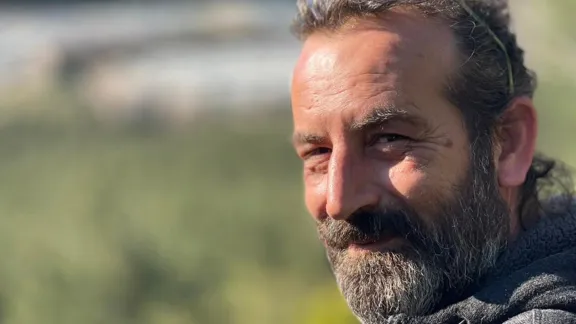"It was a calling. I knew I had to do something,” says Thanasis, who left his factory job in Athens to help migrants and refugees arriving on the Greek island of Lesbos

Thanasis, working on Lesbos with #LeaveNoOneBehind. Photo: AWoN
Living as Neighbours: Thanasis, who works with #LeaveNoOneBehind on Lesbos
(LWI) - For Thanasis, born on a Greek island not far from Athens, it was a ‘Road to Damascus’ moment that led him to Lesbos to begin a new life of rescuing migrants and refugees from the sea. As a sales and logistics manager for an aluminum factory, he was driving on the mainland when he heard on the radio about some children in a boat, who survived a shipwreck but were pushed back into the sea by coastguards and died.
“For me, it was really a calling,” he remembers. “I heard the father of two or three of the children saying he saw the coastguards kicking his kids back into the water. They could have saved them, but they didn’t. I stopped the car. I felt broken, angry, ready to explode and I knew I had to do something.”
Today, Thanasis works on Lesbos with #LeaveNoOneBehind, a German-based activist organization that supports people on the move. He tells his story in the third episode of our ‘Living as Neighbours’ podcast, an initiative of the Lutheran World Federation and A World of Neighbours network.
From factory work to sea rescues
Born in the city of Chalkida on Evia island, linked by a bridge to the mainland, Thanasis says he had “an ordinary life” for many years. Employed alongside him as colleagues in the factory were people from Pakistan and he recalls rubbing shoulders with Indian immigrants working in agricultural jobs. “All my life, I have been very open, accepting of differences and greeting people who were our neighbors in the city.”
But in 2014, it was the news about refugees being pushed back into the sea as they struggled to reach his country that marked a turning point for him. Like many Greeks at that time, Thanasis was also struggling with austerity measures imposed by his government as the country’s financial crisis deepened. His salary was cut in half, while many others lost their jobs. “I was 38 years old, and my job had been everything to me, but I knew I had to go to Lesbos. I could think of nothing else,” he says.
A year later, in September 2015, he took all his savings and arrived on the island which was receiving tens of thousands of refugees crossing from Turkey and elsewhere, many dying as their makeshift boats overturned in the sudden storms. Two days later, he was standing up to his neck in the sea with other volunteers, carrying people to safety.
New meaning to life
“That first night was chaotic and difficult: there were about 150 people in a wooden boat, close to the shore, but they were panicking and the boat was taking in water. There were about 20 of us and someone spoke Arabic, so we explained how to balance the boat and then took them, one by one on our shoulders, to the shore.”
Thanasis stayed three and a half years as a volunteer and has since been working with non-governmental organizations supporting new arrivals to Lesbos. “It’s a kind of addiction, knowing you have to respond to people in danger, but it has given new meaning to my life,” he says. He calculates that, at the height of the crisis, “some 300.000 people arrived on the island and I was on the shore to help about 80 percent of the people off those boats.”
It is difficult, but we have to do what is right.
Thanasis, working on Lesbos with #LeaveNoOneBehind
To begin with, he remembers, his compatriots were supportive and acted as good neighbors. Older Greeks especially, had memories of the war and understood what it meant to be poor or in need. “But then things changed, European countries closed their borders and our government didn’t know how to respond to a million people. There was so much fake news, a lot of hate speech.” Since 2020, he says, Lesbos has been militarized, with all kinds of special forces drafted in.
“In this new reality, the refugees are [seen as] our enemies, so it is illegal to help them. There is a silent war going on. In the beginning, we worked with the coastguards but now it is dangerous if they see my car and there are many legal cases against activists and journalists on the island,” Thanasis says. “But I am not leaving. This work has made me a better person. It is difficult, but we have to do what is right. I always say this time it is happening to them, but the next time it could happen to us.”
The Living as Neighbours podcast is a joint initiative of the Lutheran World Federation and A World of Neighbours network, which supports people helping migrants and refugees across the European continent. The project is supported by the German government through the Deutsche Gesellschaft für Internationale Zusammenarbeit. Each of the eight episodes features ordinary individuals doing extraordinary work to help the most vulnerable people stranded along some of Europe’s remotest borders.


